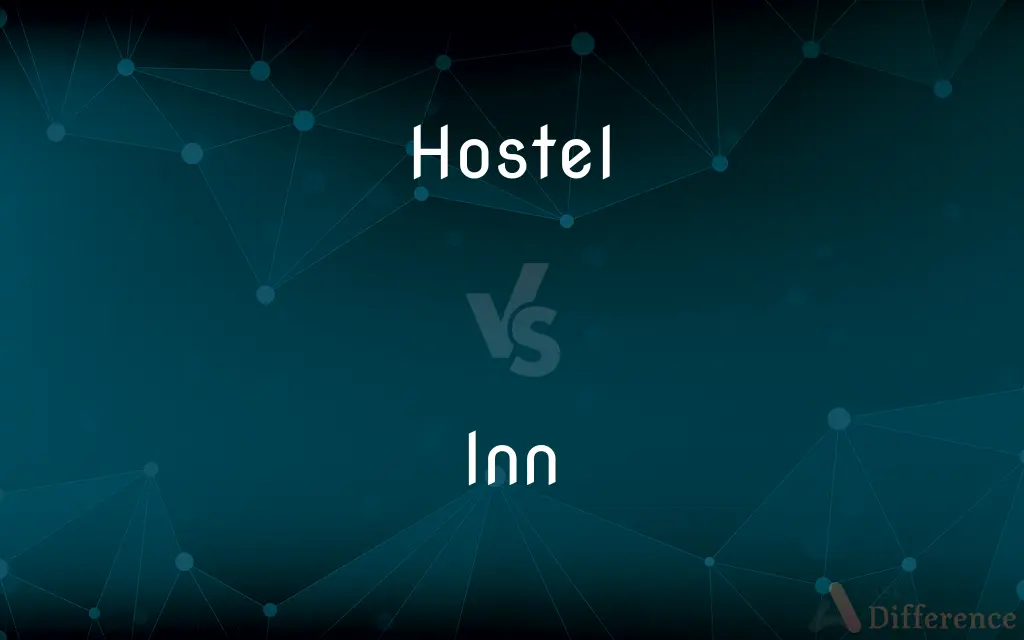Hostel vs. Inn — What's the Difference?
By Fiza Rafique & Maham Liaqat — Updated on April 9, 2024
A hostel offers shared accommodations and communal facilities, targeting budget travelers, while an inn provides private rooms and often includes meals, catering to travelers seeking comfort.

Difference Between Hostel and Inn
Table of Contents
ADVERTISEMENT
Key Differences
Hostels are designed for budget-conscious travelers, often featuring dormitory-style rooms where guests share space and amenities. This setup encourages a communal atmosphere, making it popular among young and solo travelers. On the other hand, inns offer private rooms, providing more privacy and a traditional lodging experience, which can include meals and more personalized services.
While hostels typically provide basic accommodations and communal living spaces, such as shared bathrooms and kitchens, they emphasize social interaction and affordability. This makes them appealing to backpackers and those looking to meet fellow travelers. In contrast, inns focus on comfort and convenience, often including additional amenities like on-site dining and sometimes even leisure facilities, catering to those seeking a more inclusive and quiet environment.
Hostels are known for their informal setting, often having communal activities and shared facilities that foster a sense of community. These might include communal kitchens, lounge areas, and organized social events. Inns, whereas, prioritize comfort and a more intimate setting, with services that might include housekeeping, dining, and personalized attention, appealing to travelers who desire a quieter, more relaxed stay.
The location of hostels and inns can also differ significantly. Hostels are frequently found in city centers or near major tourist attractions, making them convenient for sightseeing and exploring urban areas. Inns, on the other hand, might be located in more scenic or rural areas, offering a picturesque and tranquil setting away from the hustle and bustle of city life.
In terms of cost, hostels are generally more affordable than inns, reflecting their basic accommodations and shared facilities. This affordability makes hostels a popular choice among students, backpackers, and those traveling on a tight budget. Inns, however, offer a range of services and amenities that can justify a higher price point, appealing to travelers who are willing to spend more for additional comfort and privacy.
ADVERTISEMENT
Comparison Chart
Accommodation
Shared rooms and communal facilities.
Private rooms, sometimes with en-suite bathrooms.
Target Audience
Budget travelers, backpackers, and young travelers.
Travelers seeking comfort and a more traditional stay.
Amenities
Basic, with communal kitchens and lounges.
More comprehensive, including dining and sometimes leisure facilities.
Atmosphere
Social and communal, with opportunities to meet people.
Quieter and more private, with a focus on relaxation.
Price
Generally lower, reflecting basic facilities.
Higher, due to more services and privacy.
Compare with Definitions
Hostel
Suitable for backpackers and solo travelers.
The hostel offered guided tours, making it easy for solo travelers to explore.
Inn
Caters to travelers seeking a comfortable stay.
After a long day of hiking, returning to the comfort of the inn was a relief.
Hostel
A budget accommodation with shared rooms and facilities.
We stayed in a hostel to save money on our trip.
Inn
May include amenities like on-site dining.
Dinner at the inn's restaurant was a highlight of our trip.
Hostel
Often features amenities like communal kitchens.
Cooking in the hostel kitchen was a great way to meet other guests.
Inn
Offers private rooms, often with meals.
The inn we stayed at offered a cozy room and delicious breakfast.
Hostel
Known for its social atmosphere.
The hostel had a communal lounge where travelers from around the world shared stories.
Inn
Sometimes located in scenic areas.
The inn was nestled in the mountains, offering stunning views.
Hostel
Provides basic, affordable lodging.
The hostel was basic but clean and affordable.
Inn
Targets a more diverse clientele.
The inn attracted both families and couples looking for a peaceful getaway.
Hostel
A supervised, inexpensive lodging place for travelers, especially young travelers.
Inn
Inns are generally establishments or buildings where travelers can seek lodging, and usually, food and drink. Inns are typically located in the country or along a highway; before the advent of motorized transportation they also provided accommodation for horses.
Hostel
An inn; a hotel.
Inn
A public lodging house serving food and drink to travelers; a hotel.
Hostel
To stay at hostels while traveling.
Inn
A tavern or restaurant.
Hostel
A commercial overnight lodging place, with dormitory accommodation and shared facilities, especially a youth hostel
A rundown hostel
Inn
Chiefly British Formerly, a residence hall for students, especially law students, in London.
Hostel
(not US) A temporary refuge for the homeless providing a bed and sometimes food
Inn
Any establishment where travellers can procure lodging, food, and drink.
Hostel
(obsolete) A small, unendowed college in Oxford or Cambridge.
Inn
A tavern.
Hostel
(intransitive) To stay in a hostel during one's travels.
Inn
One of the colleges (societies or buildings) in London, for students of the law barristers.
The Inns of Court
The Inns of Chancery
Serjeants’ Inns
Hostel
(transitive) To lodge (a person) in a hostel.
Inn
The town residence of a nobleman or distinguished person.
Leicester Inn
Hostel
An inn.
So pass I hostel, hall, and grange.
Inn
(obsolete) A place of shelter; hence, dwelling; habitation; residence; abode.
Hostel
A small, unendowed college in Oxford or Cambridge.
Inn
To house; to lodge.
Hostel
A hotel providing overnight lodging for travelers
Inn
To take lodging; to lodge.
Hostel
Inexpensive supervised lodging (especially for youths on bicycling trips)
Inn
A place of shelter; hence, dwelling; habitation; residence; abode.
Therefore with me ye may take up your innFor this same night.
Inn
A house for the lodging and entertainment of travelers or wayfarers; a tavern; a public house; a hotel.
The miserable fare and miserable lodgment of a provincial inn.
Inn
The town residence of a nobleman or distinguished person; as, Leicester Inn.
Inn
One of the colleges (societies or buildings) in London, for students of the law barristers; as, the Inns of Court; the Inns of Chancery; Serjeants' Inns.
Inn
To take lodging; to lodge.
Inn
To house; to lodge.
When he had brought them into his cityAnd inned them, everich at his degree.
Inn
A hotel providing overnight lodging for travelers
Common Curiosities
What is an inn?
An inn is a lodging establishment that provides private rooms and often includes meals and additional services.
Can you find hostels in rural areas?
While hostels are more common in urban settings, some can be found in rural areas, especially near popular tourist sites.
Who typically stays at hostels?
Hostels are popular among budget travelers, backpackers, and young people looking to meet others.
Are inns more expensive than hostels?
Yes, inns are generally more expensive than hostels due to the additional privacy and amenities offered.
Do hostels offer private rooms?
While hostels mainly offer shared accommodations, some do offer private rooms for those seeking more privacy.
Are meals included at inns?
Many inns include meals, particularly breakfast, in the room rate, but offerings vary.
Do hostels have age restrictions?
Some hostels might have age restrictions, primarily to maintain a certain atmosphere, but many are open to all ages.
How do I choose between a hostel and an inn?
Your choice depends on your budget, desired level of privacy, and interest in socializing with other travelers.
What is a hostel?
A hostel is a budget-friendly accommodation offering shared rooms and communal facilities.
Do inns provide personal service?
Yes, inns often offer more personalized services compared to hostels, including dining and housekeeping.
Can families stay at inns?
Yes, inns often cater to a variety of guests, including families, offering a comfortable and quiet environment.
Are hostels safe?
Hostels are generally safe, but it's important to take precautions with personal belongings, as spaces are shared.
What makes inns different from hotels?
Inns are usually smaller and offer a more personalized experience, sometimes in more scenic or historic settings.
Is there a community aspect to staying in a hostel?
Yes, the communal nature of hostels fosters a sense of community and interaction among guests.
Can inns be found in cities?
Yes, while often located in scenic or rural locations, inns can also be found in urban settings, offering a tranquil retreat.
Share Your Discovery

Previous Comparison
Floral vs. Flower
Next Comparison
Sonnet vs. VillanelleAuthor Spotlight
Written by
Fiza RafiqueFiza Rafique is a skilled content writer at AskDifference.com, where she meticulously refines and enhances written pieces. Drawing from her vast editorial expertise, Fiza ensures clarity, accuracy, and precision in every article. Passionate about language, she continually seeks to elevate the quality of content for readers worldwide.
Co-written by
Maham Liaqat















































